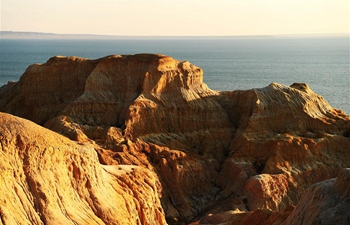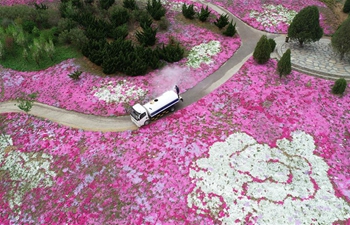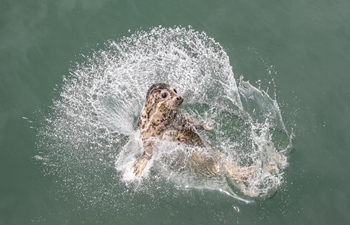WASHINGTON, May 12 (Xinhua) -- A new study has found that nitrogen from penguin and elephant seal waste helps foster biodiversity across Antarctica.
The study, published in the journal Current Biology on Thursday, revealed that the influence of their waste can spread many kilometers inland. Thus, it provides an important nitrogen source for vegetation, which in turn supports millions of small insects and worms living on the desolate land.
Researchers braved the extreme cold in the Antarctic and trudged through snow to examine the soil and plants surrounding the colonies of elephant seals, gentoo, chinstrap and Adelie penguins.
"What we see is that the poo produced by seals and penguins partly evaporates as ammonia," said Stef Bokhorst, lead author of the study and a researcher in the Department of Ecological Sciences at Vrije Universiteit Amsterdam.
"Then, the ammonia gets picked up by the wind and is blown inland, and this makes its way into the soil and provides the nitrogen that primary producers need in order to survive in this landscape," he said in a press release.
According to the study, the surface area enriched by nitrogen from penguin and elephant seal feces can spread 240 times the size of a colony.
And the result of soil enrichment is biodiversity in the Antarctic peninsula, where people can find a thriving community of mosses and lichens and an incredible number of small invertebrates, including springtails and mites.
"You can find millions of them (small invertebrates) per square meter here, but in grasslands in the U.S. or Europe, there are only about 50,000 to 100,000 per square meter," said Bokhorst.
With the study, the researchers are able to map out biodiversity hotspots across the Antarctic peninsula and update information in the future using satellite images of the location and size of breading colonies.
In the next step, the researchers aim to study whether the nitrogen-rich soil, while nourishing local lives, would also provide an ideal environment for invasive species that threaten the fragile ecosystem in the Antarctic.













